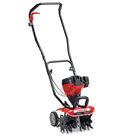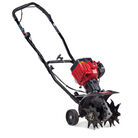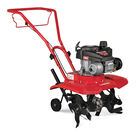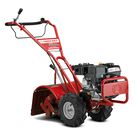Both tilling and cultivating refer to turning the soil over to break up compaction and make planting easier. They also help to mix needed amendments into the soil. The tools needed for these jobs include tillers and/or cultivators.
Both are valuable, but they’re often thought of as interchangeable when in fact they’re designed for different situations. It’s important to know the differences between a cultivator and a tiller, so you can choose the right tool depending on your situation and the task at hand.
What does a cultivator do?
People often ask what a cultivator is used for. One of the primary uses of a cultivator is to mix loose soil. It is ideal for getting previously established gardens or small beds and vegetable gardens ready for the season. A cultivator will help you mix potting and regular soil together; break up small weeds and grasses to prevent them from taking over your garden; or work light amounts of fertilizer, manure or compost into your soil mixture.
What is a tiller?
Tillers are best used when you are tending to bigger plots or have more space to work. Garden tillers are also ideal for installing a new garden because you’ll likely have a lot of hard ground or rocky soil that needs to be loosened. This is the perfect task for a tiller.
Can I use a cultivator as a tiller?
Cultivators are used for close work in smaller spaces. In these situations, a tiller would not be ideal because it would be difficult to maneuver and control in a confined area. If you’re creating a new garden plot, cultivators are unlikely to work because their tines are not heavy duty enough to loosen hard soil. However, even though tillers are more powerful than cultivators, you shouldn’t necessarily use a garden tiller to do the work of a cultivator. A tiller is likely to loosen more dirt than anticipated. As a result, your soil mixture may not be exactly what you had imagined.
What are the different types of tillers?
Tillers come in more variety than cultivators because they’re used to tend gardens of a variety of sizes. As such, they have to satisfy many different needs.
There are two primary types of tillers: front-tine tillers and rear-tine tillers. Many question if a front-tine or rear-tine tiller is better suited to meet the demands of their yard. A front-tine tiller is more compact and maneuverable than its rear-tine counterpart, making it ideal for turning soil to improve planting conditions in smaller spaces. Rear-tine tillers work to break through ground with more power and speed, making them a good choice for larger gardens or projects.
The rotation of the tines also impacts how the tiller performs. Tillers with forward-rotating tines move in the same direction as the wheels and are best used in areas that have previously been filled. Counter-rotating tines move in the opposite direction of the wheels and are best for breaking new ground and working in hard or challenging soils.
Dual-rotating tine tillers have dual-direction functionality, allowing you to switch between counter-rotating and forward-rotating tine direction to optimize tilling performance in a variety of soil conditions.
Choosing the right tool
Garden tillers and cultivators might look the same on the surface, but they perform two distinct functions. Knowing the differences between a tiller and a cultivator will help you choose the right piece of equipment and ensure you have the best garden possible. TroyBilt.com has a complete line of cultivators and tillers with helpful features that best suit your needs.







